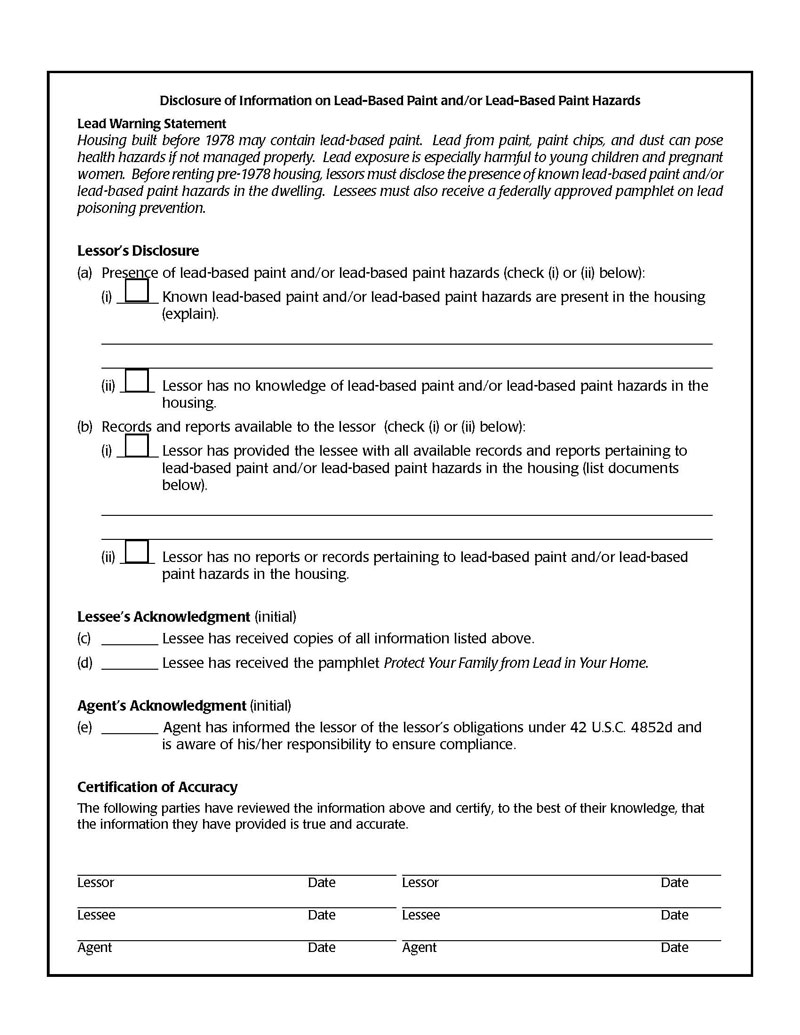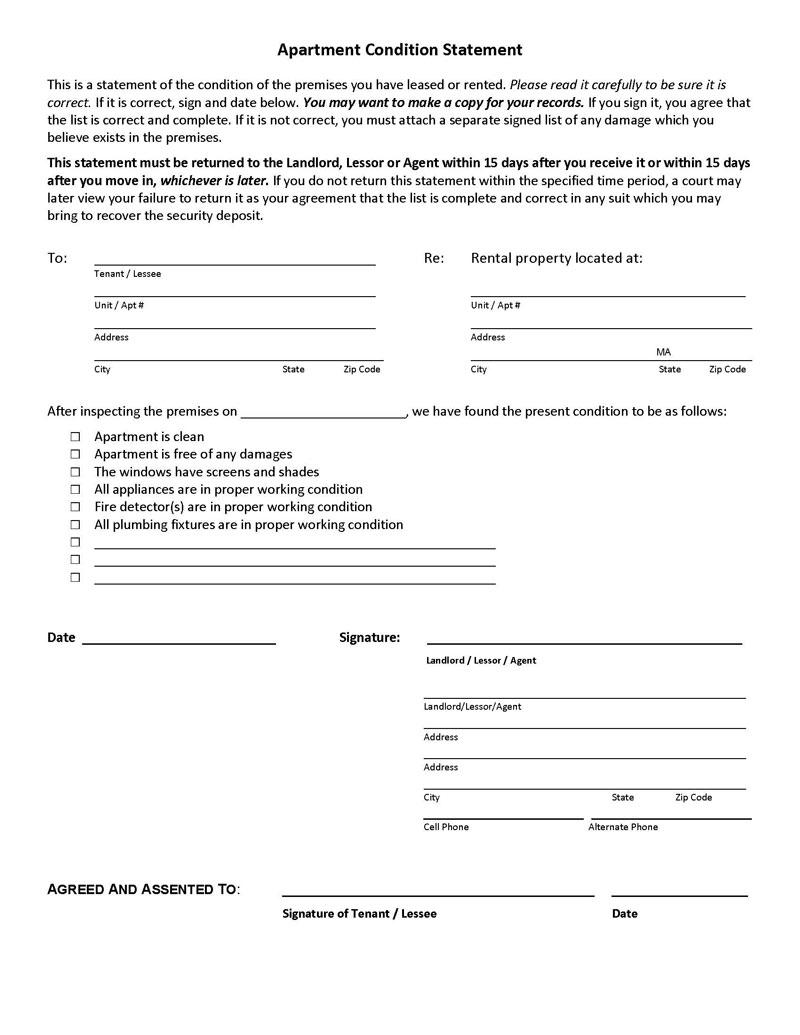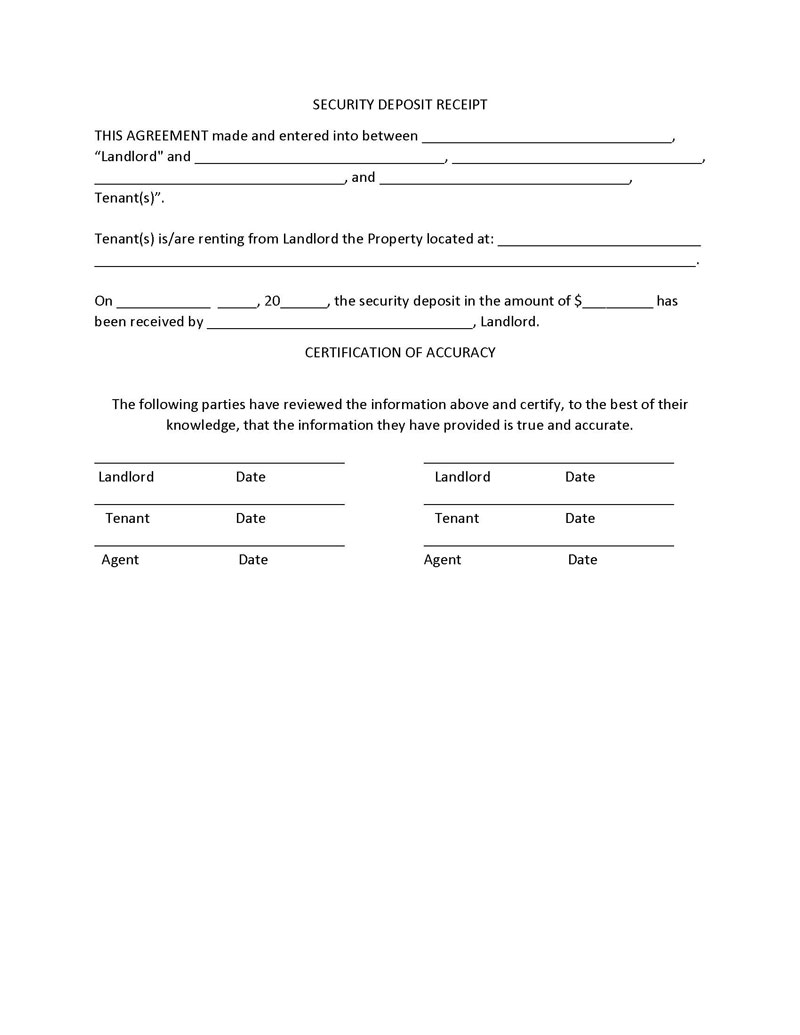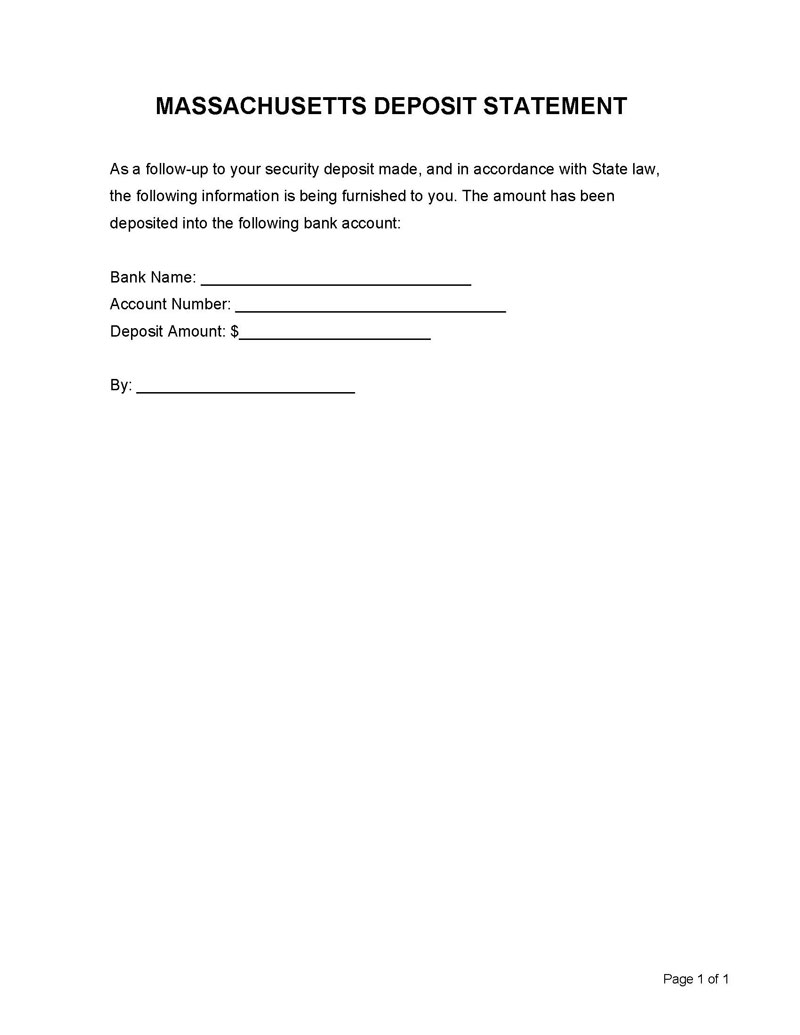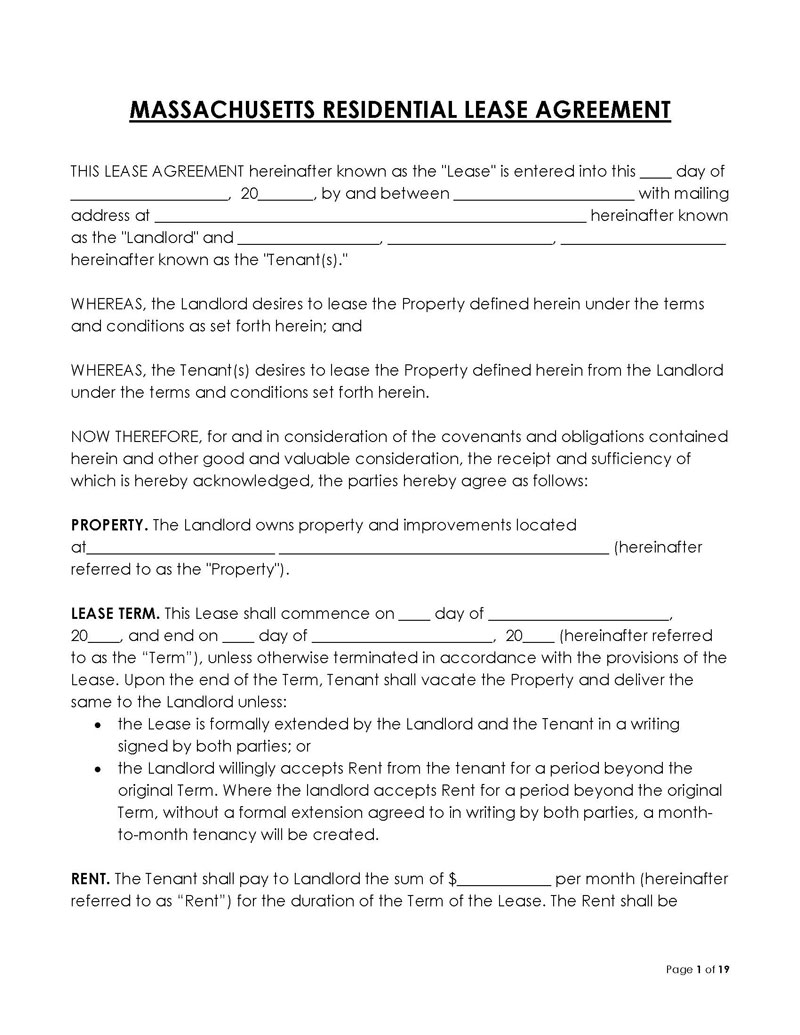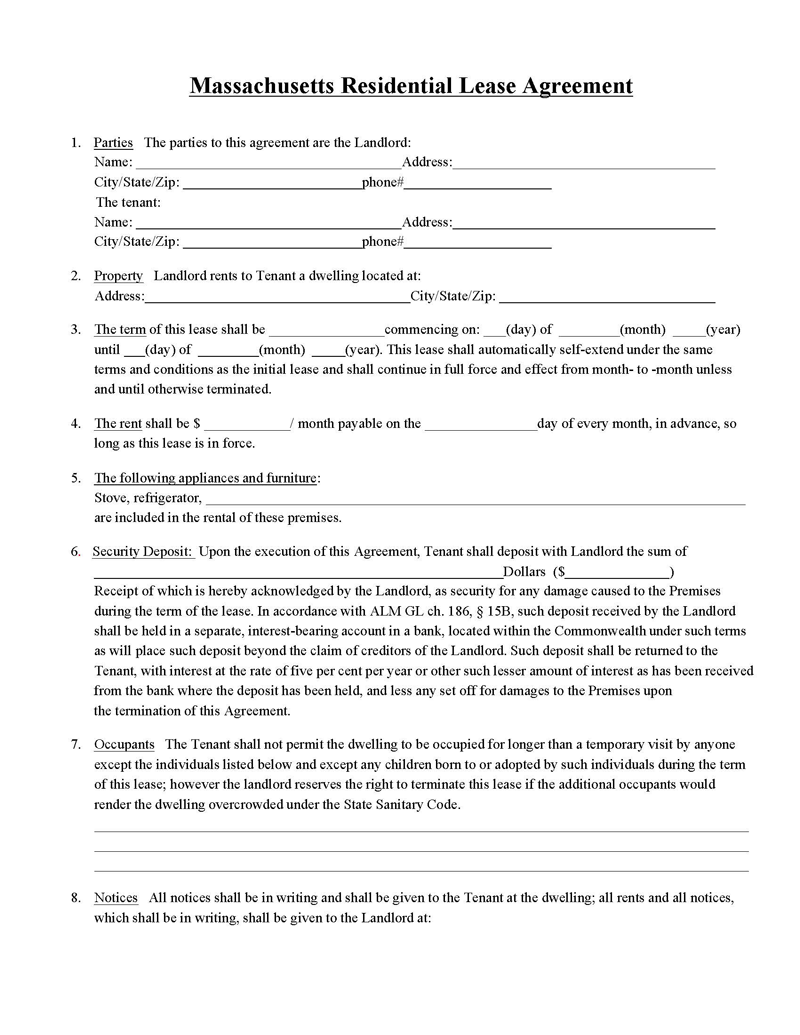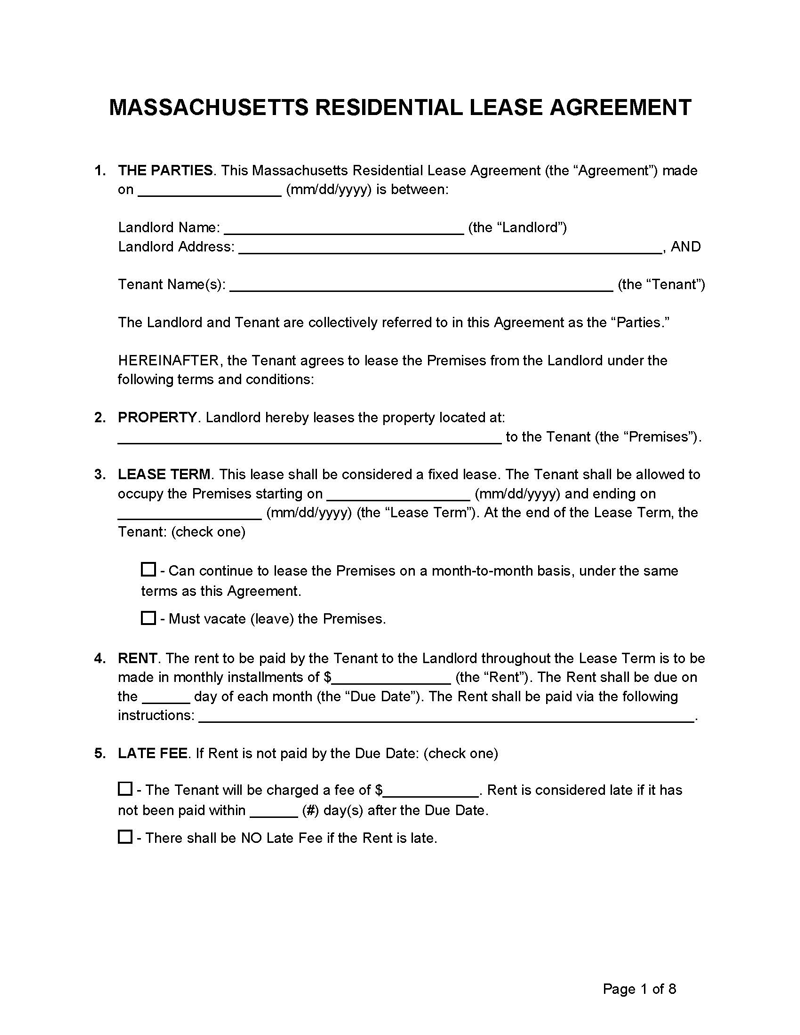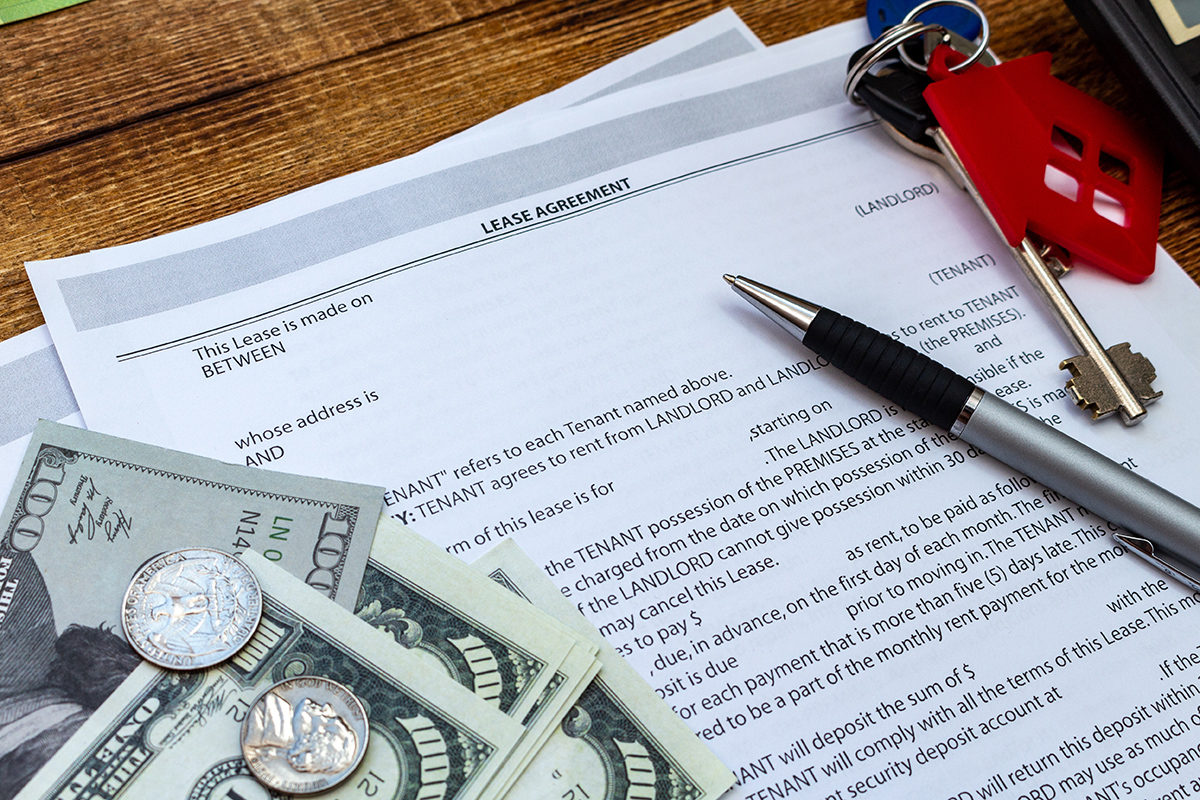A Massachusetts lease agreement is a legal contractual establishment between a landlord (lessor) and a tenant (lessee) on using a rental property.
It details the requirements and conditions laid out by the lessor for renting out their property and the lessee’s agreement to the laid-out terms. The purpose of the agreement in Massachusetts is to present the terms of the tenancy to both parties, and record the terms agreed to at the start of the tenancy. In this way, both parties are made aware of what they agreed to, and whenever a dispute arises, the lease can be referred to for identifying a violation.
Having a lease at the start of a tenancy is highly advisable as it protects both the lessor and the lessee for the duration of the contract. Aside from listing the obligations of both parties, the agreement also serves as documentation of the length of the tenancy, the rent to be paid and when, the security deposit at the start of the tenancy, pets on the property, utilities, subletting, and other conditions on which the contract can be terminated. Finally, a signed the agreement clearly states that the landlord of a rental property has given his assent to the tenant to occupy the property for an agreed-upon time.
When is Rent Due?
No statute dictates the payment arrangement to be set up between the lessor and lessee in Massachusetts. Therefore, the payment arrangement is entirely at the discretion of the two parties. Most tenancy arrangements use a monthly basis for payment, with the duration for each month typically being measured as thirty days. So, for most arrangements, the rent will usually be due every thirty days.
Ch. 186 § 15B(1)(c) does make an imposition that interest or late penalty fee can only be applied for failure to pay rent on time if thirty days have passed since the due date of the rent.
Disclosures Required by Massachusetts Landlord-Tenant Law
The laws of the state of Massachusetts put in place several impositions which promote transparency in dealings between a lessor and lessee. The lessee has the right to view information that protects them from fraudulent behavior and exploitation.
Fire insurance
Ch. 186 § 21 expresses the rights of a lessee to make a written request of the lessor about the fire insurance of the rental property. The lessor is obligated to disclose in writing the name of the company insuring the property against fire damage, the amount of insurance provided, and the name of the person entitled to the insurance claim. This disclosure must be made within fifteen days of the request. A failure to comply with such a written request will make the lessor liable to a monetary punishment of not more than five hundred dollars.
The right of the lessee to request this disclosure cannot be waived on any lease agreement. Any lease which does this is rendered void and unenforceable.
Statement of condition
The lessor, upon receipt of a security deposit, must provide to the lessee a written statement of the present condition of the rental property. This is per Ch. 186 § 15B(2)(c). Within ten days after receiving the deposit, the lessor must provide this document which must contain a description of the rental property at the time of leasing and a listing of any damage existing on the property.
Disclosure of lead-based hazards
This disclosure protects residents of a building from being exposed to the hazards of lead paint. This disclosure is mandated by federal law under §4852(d) under Title 42 of the U.S. Code. A lessor of a building containing lead paint must disclose this information to the lessee. It must also include a lead hazard information pamphlet and an allowance of 10 days to let the lessee conduct a risk assessment of the hazard.
If the building was constructed before the year 1978, the lessee must be informed that there is a potential lead paint hazard in the building. This is mandatory, even if there is no known location of lead paint in the building.
Security deposit receipt
The mandates of Ch. 186 § 15B(2)(b) make it compulsory for a lessor to maintain transparency with the lessee at all times regarding the use of the security deposit on the property. Whenever the lessor receives a security deposit from the tenant, the lessor must issue a receipt that includes the amount of the security deposit, the name of the lessee, the date the deposit is received, the description of the rental property, and the signature of the lessor.
Follow-up deposit statement
After receiving a security deposit, the lessor must issue the lessee a receipt for the deposition of the security deposit in an interest-bearing bank. This is in accordance with Ch. 186 § 15B(3)(a). The lessor must give the lessee a receipt within thirty days, indicating that the money has been deposited. The receipt must include the name and address of the bank, the amount deposited, and the account number.
Massachusetts Rental Lease Agreements
There are different types of contracts that can be made between a lessor and a lessee over a rental property. To accurately represent each type of agreement, different lease types facilitate a particular use of the property, govern the continuity of the lease, or account for other custom arrangements:
Association of realtors
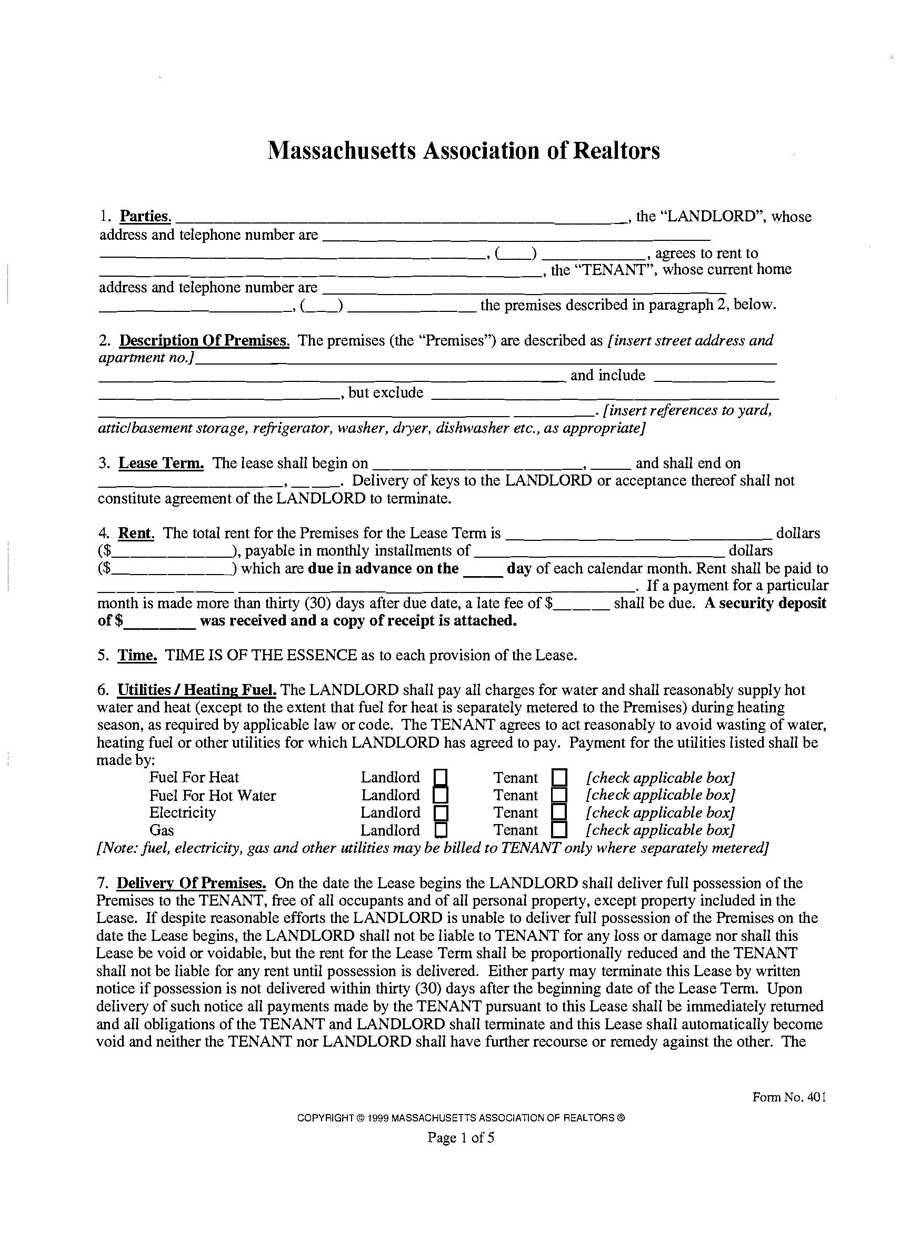
This is a specific agreement used by a licensed realtor to lease out a rental property to a tenant on behalf of a landlord. This agreement is similar to a standard agreement but typically includes a provision that the lessor will give a commission to the realtor.
The realtor negotiates the terms of the agreement with the tenant and obtains the signature of both the tenant and landlord. This type of agreement also includes a section for the realtor to sign and include his/her company information, name, and company I.D.
Commercial lease agreement
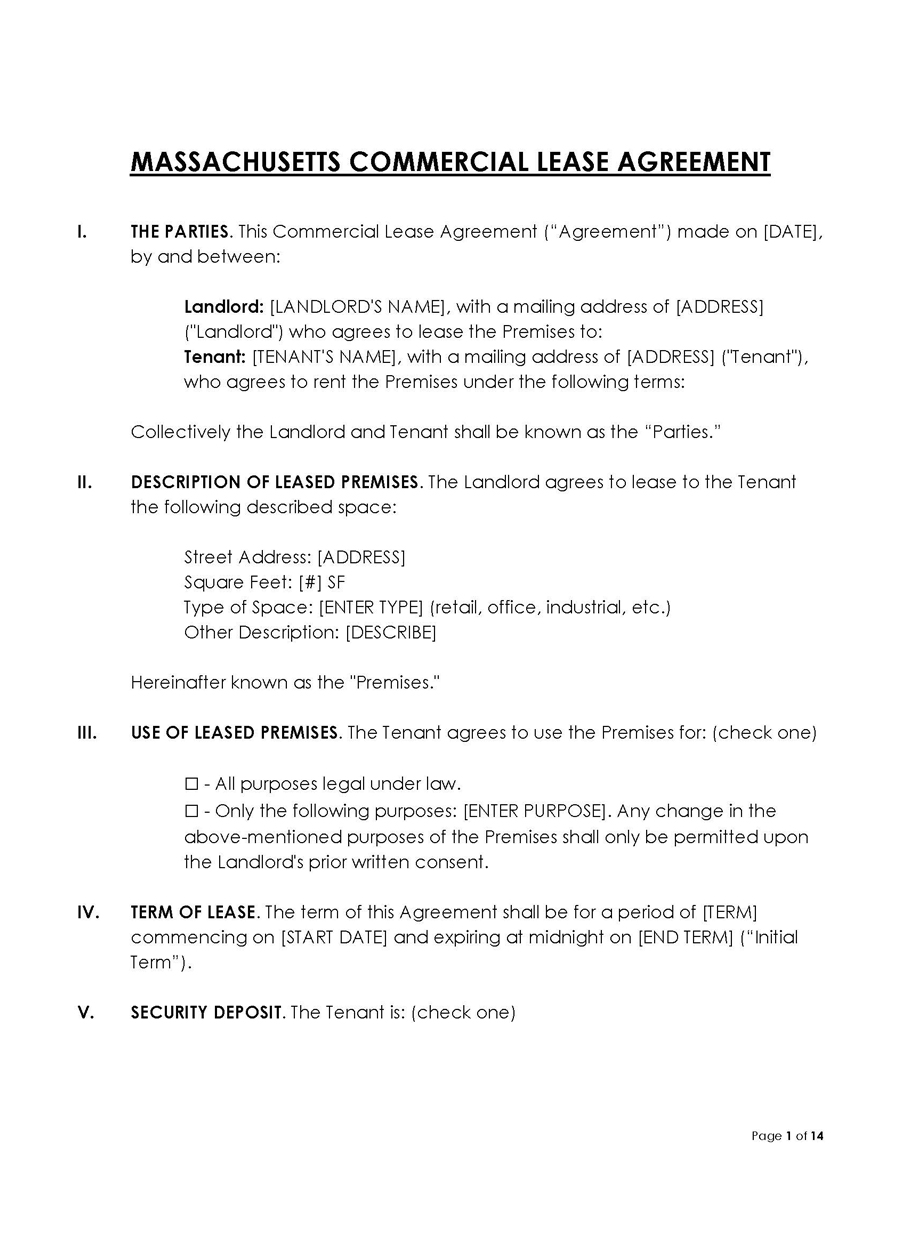
A commercial lease agreement is used to record the terms on which a rental space is provided to a tenant who wishes to conduct business operations on the premises. This type of the agreement is used to rent out a property for use as office space, retail location, or industrial production.
Greater Boston residential lease agreement
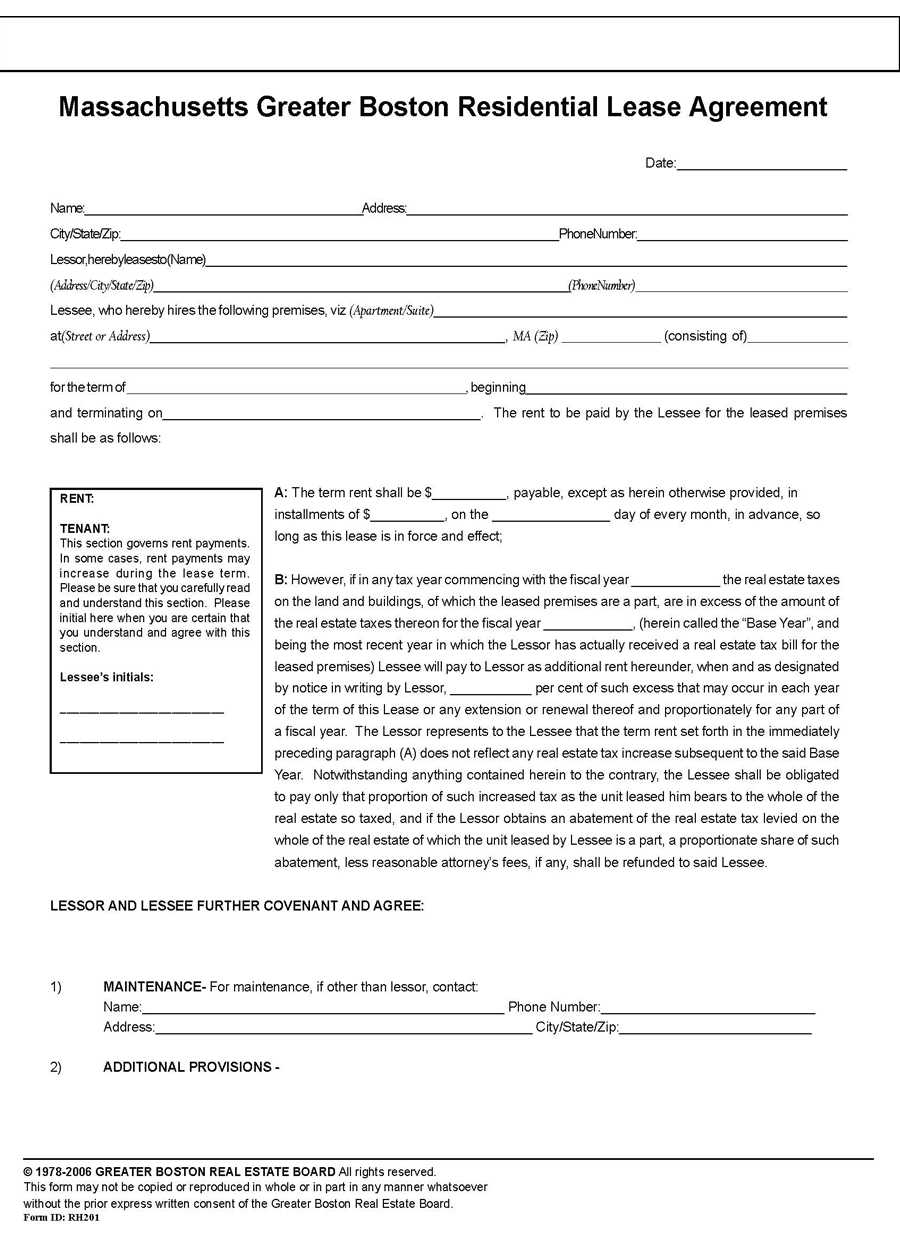
This type of agreement is similar to a standard residential lease agreement but is used for contracts to rent out a residential space in the Greater Boston area. This type of the agreement is governed by the statutes of the Boston municipality.
Month-to-month lease agreement
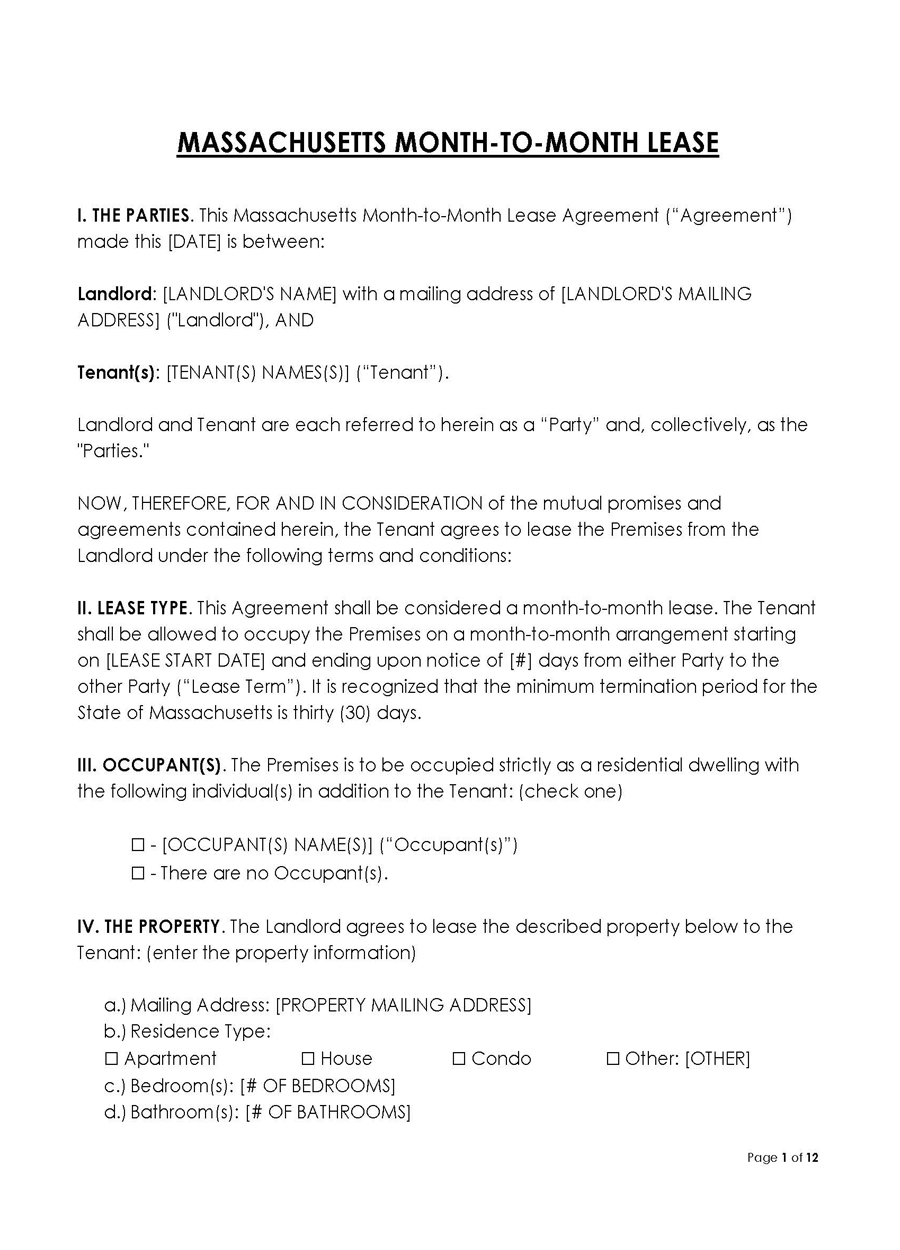
It is used for rental agreements in which the leased property is to be used by the lessee month after month for an undetermined period until canceled. This is a short-term lease, and becomes renewed every time the rent is paid. Whenever either party wishes to terminate the lease, the other party is to be given at least thirty days’ notice, after which the lease ends.
Rent-to-own lease agreement
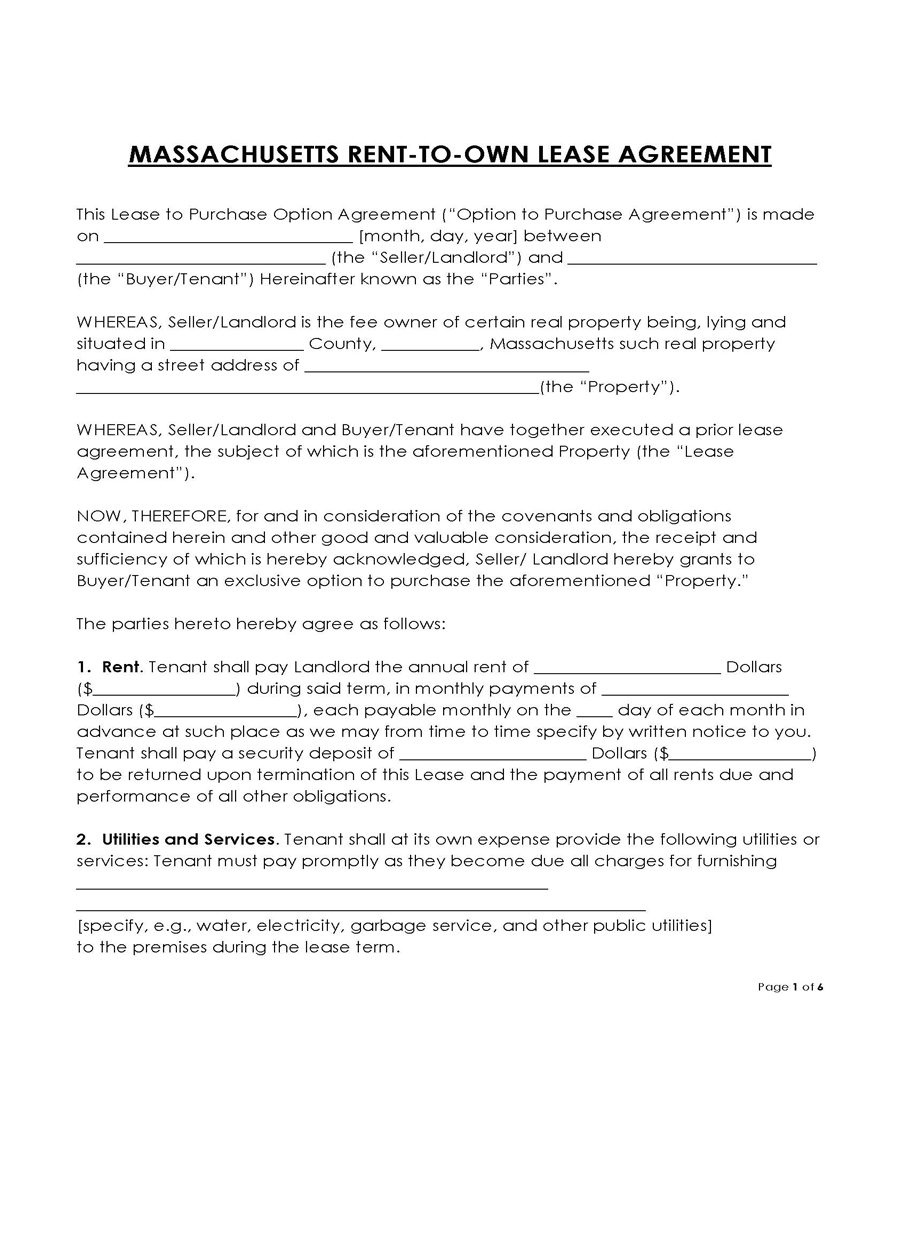
This type of agreement includes the option for the lessee to purchase the property during the duration of the lease or at the end of the lease. A price for the property is negotiated by the two parties at the start of the tenancy, and the lessee moves into the property.
The lessee is required to provide an upfront pee to contribute to the down payment of the property, or pay a higher rent, part of which goes to paying for the property. Before the lease expires, the lessee can choose to buy the property for the amount negotiated, or forfeit what has already been paid and let the lease expire.
Roommate lease agreement

It allows for multiple persons to sign as lessees in a tenancy agreement. This is used for persons who wish to occupy a rental space together, with the maximum being set at four. Each person to occupy the property must agree to the terms of the occupation and co sign the lease. In this manner, all the lessees are individually accountable for the terms of the agreement.
Standard lease agreement
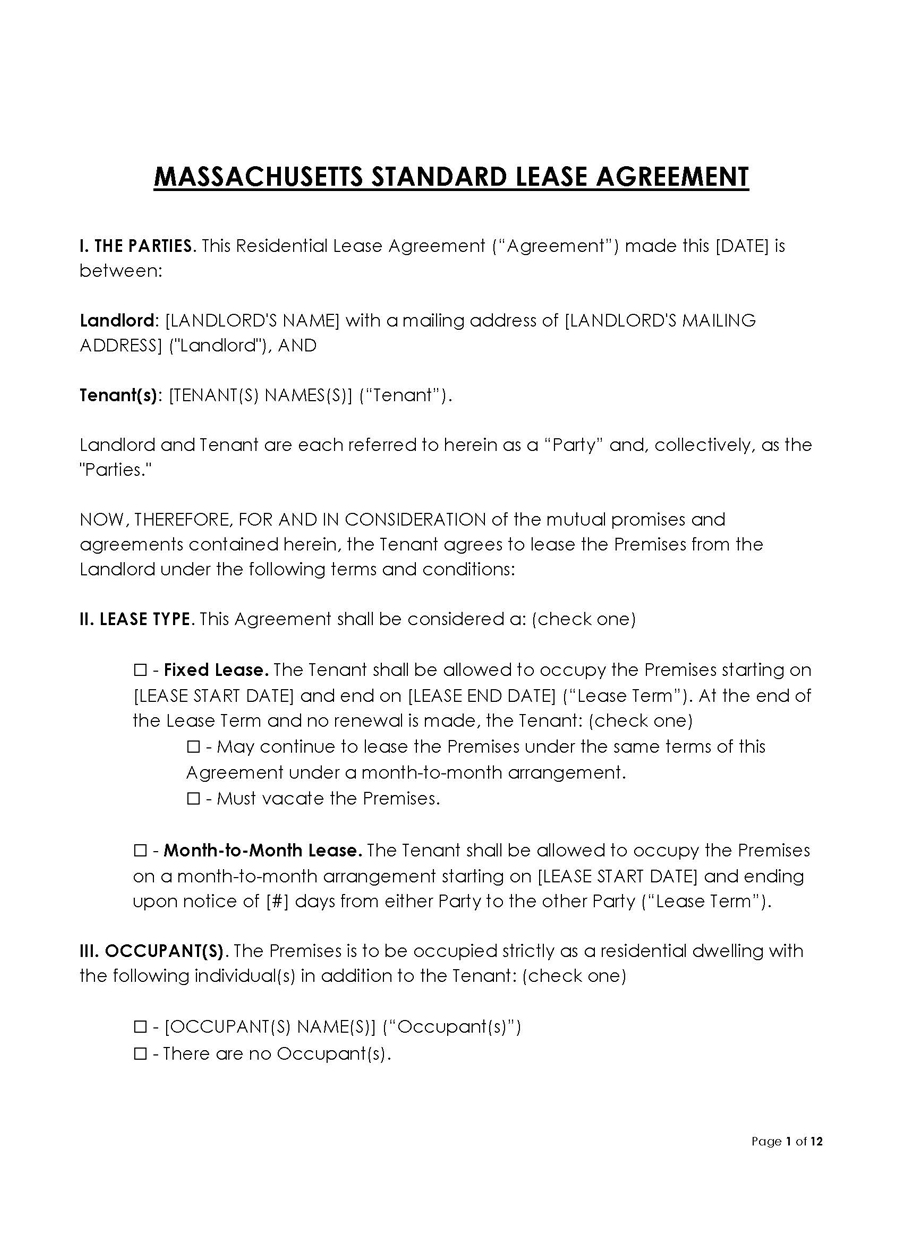
This is a typical agreement used for residential rental properties to be occupied only by one person. This addresses the necessary terms of the tenancy, including the duration, the rent to be paid, the security deposit, and the obligations of the tenant.
Sublease agreement
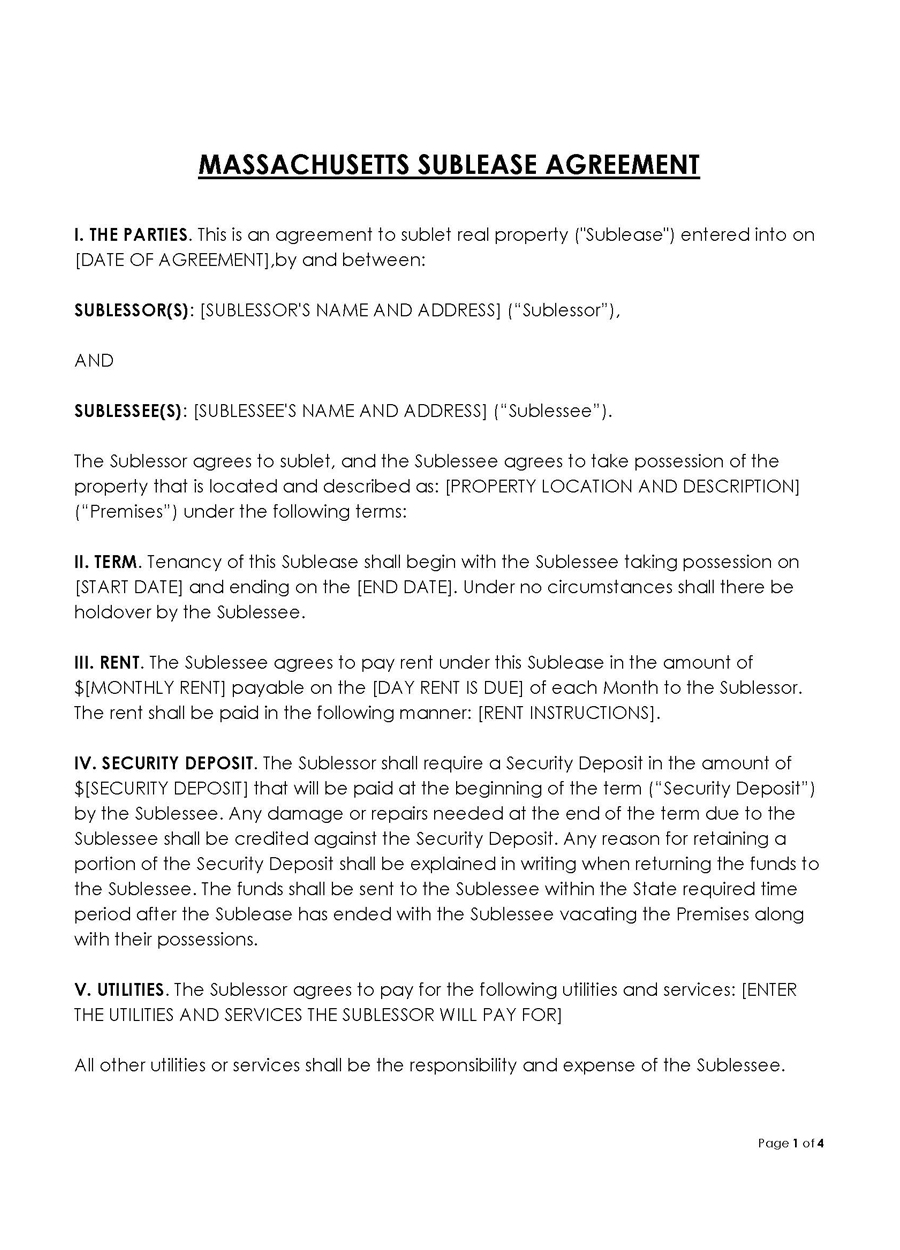
A sublease agreement is used to create a hierarchical tenancy structure, in which the lessee for a rental property leases out all or part of the property to another person. The initial lessee then becomes a sub-lessor to the sub-lessee. The sub-lessee creates a contractual agreement with the sub-lessor.
This new sub-contract is subject to the principal lease contract, and cannot provide privileges not afforded by the principal contract. This includes the duration of the tenancy and obligations.
Consider using one of the agreement templates we offer as a guide for drawing up contracts between yourself and your tenants. Drafted to meet all state law requirements and precisely worded, our templates will save your time and protect you for the duration of your contract.
Free Templates
Given below are Massachusetts lease agreement templates:
How Much Notice Should a Landlord Give for Entering the Property?
The right of a landlord to enter a property currently under a lease is expressed under Ch. 186 § 15B(1)(a). The landlord is restricted from entering the property at any time before the termination of the lease except to inspect the premises, make repairs, or show the property to a prospective tenant, purchaser, mortgagee, or its agents. However, the landlord can enter the premises upon court order, or if the premises appear to have been abandoned by the lessee.
If the landlord wishes to enter the property to make repairs, under Sanitary Code 410.810, the landlord must give the lessee a reasonable notice of not less than 24 hours. For any other purpose besides repairs, the landlord must also provide reasonable notice to the lessee before entering the property.
Security Deposit Procedures and Laws in Massachusetts
At the start of a tenancy and before the tenant moves into the property, the landlord is entitled to request a security deposit from the tenant. The security deposit is a sum that functions as a cover for defaults on rent or to pay for damages to the property caused by the tenant. Being an integral part of any lease, there are several regulations under Massachusetts law regarding security deposits in Section 15b of Chapter 186 of the Massachusetts General Laws.
It is set forth in this section that a security deposit must not exceed the cost of one month’s rent. This security remains the property of the tenant, and is not to be included with the lessor’s assets at any time, even to settle debts. Upon receipt of a security deposit from the tenant, the lessor is to provide a receipt for the amount received and the description of the premises leased, including any existing damage to the property. A record must be kept for every security deposit collected from the lessee at any time, along with a detailed description of any damage to the property and the cost of repairs for which the security deposit was required. These records are to be maintained for a minimum of two years from the date the tenancy is terminated.
As further required under this section, any security deposit received by the lessor must be held in an interest-bearing account in a bank located in the state of Massachusetts. A receipt of the deposition in the bank must be provided to the lessee within thirty days after the deposit was received. In addition, at every yearly anniversary of the tenancy, the lessor must provide to the lessee the interest accrued on the deposit along with a statement showing the name of the bank in which the deposit was placed, the address of the bank, the amount of the deposit, the account number and the amount of interest payable. The interest must be at a minimum of 5%. At the end of the tenancy, any accrued interest on the security deposit, along with the deposit itself, if no deductions are to be made, must be returned to the lessee within thirty days.
Failure on the lessor’s part to comply with any of the requirements set forth under this law can lead to legal ramifications not limited to being ordered to pay up to three times the amount of interest owed to the lessee, or loss of the security deposit altogether.
Final Thoughts
A Massachusetts lease agreement is a legally binding document between a landlord and a tenant. It records the contract between the two and guides the tenancy. As a legal tool, the agreement is regulated under state law, and is specialized to handle different contract types. It would be best to use our contract templates to cater to these requirements and serve as the perfect means of protecting yourself in a tenancy relationship.
